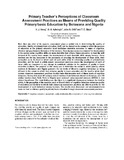| dc.contributor.author | Nenty, H.J. | |
| dc.contributor.author | Adedoyin, O.O. | |
| dc.contributor.author | Odili, J.N. | |
| dc.contributor.author | Major, T.E. | |
| dc.date.accessioned | 2010-08-24T07:55:39Z | |
| dc.date.available | 2010-08-24T07:55:39Z | |
| dc.date.issued | 2007-04 | |
| dc.identifier.citation | Nenty, H.J. et al (2007) Primary teacher’s perceptions of classroom assessment practices as means of providing quality primary/basic education by Botswana and Nigeria, Educational Research and Review, Vol. 2, No. 4, pp. 74-81 | en_US |
| dc.identifier.issn | 1990-3839 | |
| dc.identifier.uri | http://hdl.handle.net/10311/589 | |
| dc.description.abstract | More than any other of its aspects, assessment plays a central role in determining the quality of education. Quality of primary/basic education (QoE) can be viewed as the extent to which the process of education at the primary education level maximizes desirable outcomes in terms of cognitive, affective and psychomotor behaviour of the learners. Given human resources demand for development in the society some cognitive skills are more desirable than others. Hence education, to meet the skill demand of the society must ensure the development of such desirable skills among learners. Since teachers are the key executors in the processes of ensuring the development of these skills, their perception as to the level to which each of such skills differ in enhancing quality of primary/basic education, and the level to which current assessment practices ensure the development of each of these skills are important in any attempt to contribute solution to the problem of quality in basic education in Africa. The purpose of this study was to determine the extent to which primary school teachers in Botswana and Nigeria perceive the six levels of Bloom’s cognitive behaviour as being different in the extent to which they enhance quality in basic education and the level to which their current classroom assessment practices involve items that measure each of these levels of cognitive behaviour. Survey data from 191 primary school teachers from Gaborone district in Botswana, and 300 similar teachers from Delta State in Nigeria were analysed using repeated measure ANOVA to test related hypotheses. The main finding was that there is a significant discrepancy between the level to which, in the perception of the teachers, each of Bloom’s level of cognitive behaviour enhances quality of education and the level to which their classroom assessment practices are able to provide for the development of such behaviour among learners. The results were discussed and recommendations made on how to enhance quality in primary/basic education through classroom assessment practices. | en_US |
| dc.language.iso | en | en_US |
| dc.publisher | Academic Journals. http://www.academicjournals.org | en_US |
| dc.subject | Primary/basic education | en_US |
| dc.subject | Assessment | en_US |
| dc.subject | Quality of education | en_US |
| dc.subject | Bloom taxonomy of human cognitive behaviour | en_US |
| dc.subject | Botswana | en_US |
| dc.subject | Nigeria | en_US |
| dc.title | Primary teacher’s perceptions of classroom assessment practices as means of providing quality primary/basic education by Botswana and Nigeria | en_US |
| dc.type | Published Article | en_US |
| dc.link | http://www.academicjournals.org/ERR/PDF/pdf%202007/Apr/Nenty%20et%20al.pdf | en_US |

